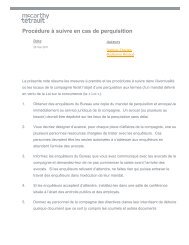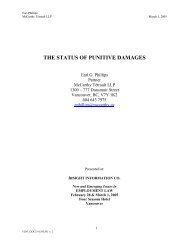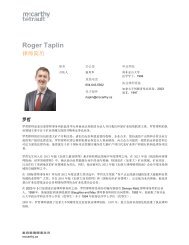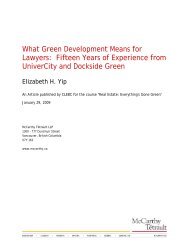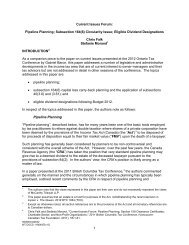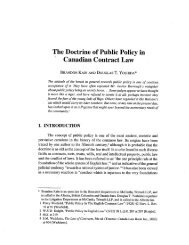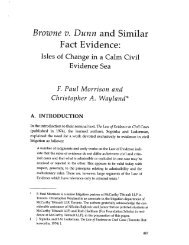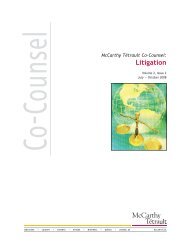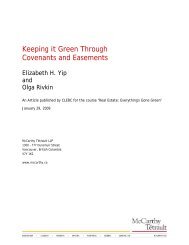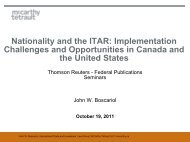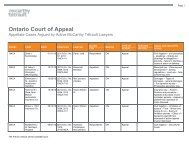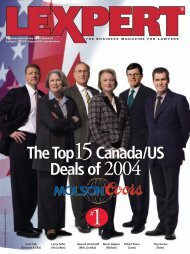1. COMPETITION - McCarthy Tétrault
1. COMPETITION - McCarthy Tétrault
1. COMPETITION - McCarthy Tétrault
Create successful ePaper yourself
Turn your PDF publications into a flip-book with our unique Google optimized e-Paper software.
Sending such communication to recipients other than consumers is<br />
permissible without prior consent if the recipient is explicitly given the<br />
opportunity to object to receiving further messages (§ 107 para. 4 TKG<br />
2003). By its clear wording, the legislature emphasized that sending<br />
commercial communication to recipients other than consumers can no<br />
longer be considered unfair competition or a violation of privacy or<br />
property.<br />
In any event, sending commercial e-mail or SMS is impermissible if the<br />
identity of the sender, on whose behalf the communication is made, is<br />
disguised or concealed, or if no valid address is provided to which the<br />
recipient may send a request that such communication cease (§ 107 para.<br />
5 TKG 2003). According to § 109 para. 3 TKG 2003, a violation of these<br />
rules may warrant an imposable fine of up to $37,000.<br />
The question remains whether the distinction between consumers and<br />
non-consumers will assist the development of electronic commerce in<br />
Austria. However, it is evident that Austria failed to accurately implement<br />
Directive 2002/58/EC, which grants protection against the use of e-mail for<br />
the purpose of direct marketing without prior consent to each recipient that<br />
is a natural person (Art 13 para 1). The rights granted by Art 13 may not be<br />
restricted by the Member States according to Art 15 para 1 of the Directive.<br />
For more information please contact: thomas_fraiss@yahoo.de<br />
UK<br />
PERSISTENT MISUSE OF<br />
ELECTRONIC COMMUNICATIONS<br />
The Communications Act 2003 ("the Act") includes provisions aimed at<br />
empowering OFCOM to deal with behaviour which amounts to a 'persistent<br />
misuse' of an electronic communications system or network, but which falls<br />
short of constituting a criminal offence. The relevant powers of<br />
enforcement are provided to OFCOM in sections 128 & 131 of the Act.<br />
Under section 131, OFCOM is required to publish a statement outlining its<br />
general policy toward the exercise of its powers under the Act dealing with<br />
the persistent misuse of a relevant network or service. OFCOM published<br />
its policy statement in this regard on 28 August 2003.<br />
The Act defines "persistent misuse" as behaviour that has the effect, or<br />
likely effect, of causing someone to suffer annoyance, inconvenience or<br />
anxiety. The new rules are a consumer protection measure designed to<br />
protect consumers. OFTEL has stated that it considers that conduct will<br />
have the "likely effect" of causing annoyance, inconvenience or anxiety if<br />
such an effect is "probable", but not necessarily proven. In considering<br />
whether a person has "persistently" misused a network, OFTEL will look at<br />
the number, frequency and regularity of the alleged behaviour. It is not<br />
necessary that the conduct involve the same network or service on each<br />
occasion or that the same person be the target of the conduct in order for<br />
behaviour to be persistent.<br />
OFTEL has identified six general areas in which the persistent misuse of<br />
networks is most likely to occur: the misuse of automatic calling equipment<br />
to undertake short duration calls, recorded messages or fax messages<br />
without the consent of the recipient; silent or short duration calls (where the<br />
caller hangs up before the recipient has time to answer); number scanning<br />
to determine whether telephone numbers are in service or not; misuse of<br />
calling line identification (CLI) technology, such as the forwarding of<br />
misleading or inauthentic CLI information; dishonest or fraudulent activities<br />
such as directing consumers misleadingly to premium rate numbers; and<br />
misuse of allocated telephone numbers.<br />
For more information please contact: colin.long@olswang.com<br />
4. DIGITAL SIGNATURES<br />
MEXICO<br />
NEW REGULATIONS ON ELECTRONIC SIGNATURE<br />
On 29th August 2003, the Federal Official Gazette ("Diario Oficial de la<br />
Federación") published several amendments to the Federal Commercial<br />
Code (the "Code") on electronic commerce to regulate electronic<br />
signatures. The amendments aim to give more sustenance to prior<br />
amendments of May 2000, where several provisions on Data Messages,<br />
their implications in contract formation, and their validity as courtroom<br />
evidence were incorporated into the Code, the Federal Civil Code, and the<br />
Federal Law on Consumer Protection. Critics of the May 2000<br />
amendments claim they did not adopt all provisions of the UNCITRAL<br />
model law on Electronic Commerce. The amendments of 29th August 2003<br />
should remedy this deficiency by establishing rules that consider the<br />
delivery and receipt of data messages and the preservation of said<br />
messages.<br />
The main principles adhered to in the new amendments are: technological<br />
neutrality, contractual freedom of the parties, international compatibility,<br />
and functional equivalence of data messages, with respect to the<br />
information contained therein and the electronic signature vis à vis the<br />
handwritten signature. While the May 2000 amendments had simply<br />
mentioned the notion of an electronic or digital signature, the new<br />
amendments elaborate on this idea by adopting the provisions of the<br />
UNICTRAL Model law on Electronic Signatures. The new amendments<br />
thus give regard to public key infrastructure models and seek to grant the<br />
same validity to electronic signatures as that afforded to handwritten<br />
signatures. Under the amendments to the Code, the electronic signature<br />
will be deemed reliable if:<br />
• the data related to the creation of the signature is exclusive of the<br />
signatory;<br />
• the data related to the creation of the signature is under the exclusive<br />
control of the signatory;<br />
• it is possible to detect any alteration on the electronic signature after<br />
its signature; and<br />
• as to the integrity of data messages, it is possible to detect any<br />
alterations thereto after signature.<br />
As was the case with the UNCITRAL Model law on Electronic Signatures,<br />
the amendments imposed a series of obligations on:<br />
• the issuer of the message;<br />
• the providers of certification services (a concept that is also adopted in<br />
this amendment); and<br />
• the recipient of the message.<br />
Among said obligations, the signatory is bound to act diligently to establish<br />
reasonable means to avoid the non-authorized use of the data related to<br />
the creation of the signature, while the recipient is bound to verify the<br />
reliability of the electronic signature or of the validity of the certificate<br />
issued to support the corresponding signature.<br />
Notary publics and private entities will be able to apply to become<br />
certification service providers before the Ministry of Economy under certain<br />
rules to be enacted by the Ministry within 90 days from the publication of<br />
the amendments. The amendments will become enforceable on that date.<br />
Among other responsibilities, certification service providers must verify the<br />
identity of any applicant and any other relevant circumstances for the<br />
ISSUE 22 SEPTEMBER – OCTOBER 2003 4



